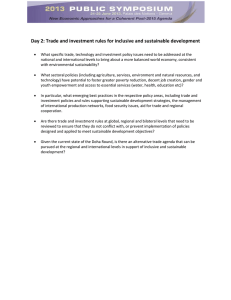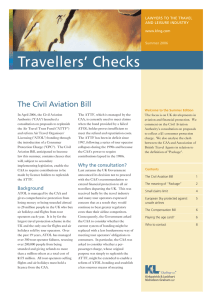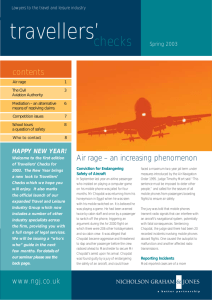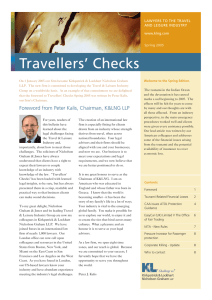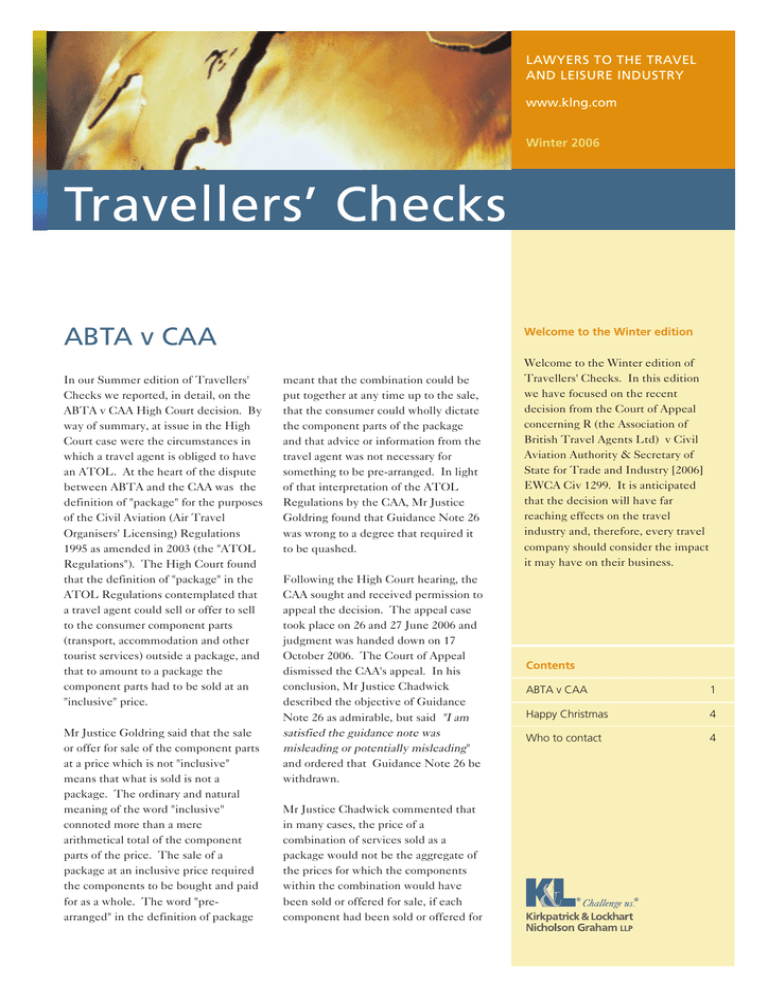
LAWYERS TO THE TRAVEL
AND LEISURE INDUSTRY
www.klng.com
Winter 2006
Travellers’ Checks
ABTA v CAA
In our Summer edition of Travellers'
Checks we reported, in detail, on the
ABTA v CAA High Court decision. By
way of summary, at issue in the High
Court case were the circumstances in
which a travel agent is obliged to have
an ATOL. At the heart of the dispute
between ABTA and the CAA was the
definition of "package" for the purposes
of the Civil Aviation (Air Travel
Organisers' Licensing) Regulations
1995 as amended in 2003 (the "ATOL
Regulations"). The High Court found
that the definition of "package" in the
ATOL Regulations contemplated that
a travel agent could sell or offer to sell
to the consumer component parts
(transport, accommodation and other
tourist services) outside a package, and
that to amount to a package the
component parts had to be sold at an
"inclusive" price.
Mr Justice Goldring said that the sale
or offer for sale of the component parts
at a price which is not "inclusive"
means that what is sold is not a
package. The ordinary and natural
meaning of the word "inclusive"
connoted more than a mere
arithmetical total of the component
parts of the price. The sale of a
package at an inclusive price required
the components to be bought and paid
for as a whole. The word "prearranged" in the definition of package
Welcome to the Winter edition
meant that the combination could be
put together at any time up to the sale,
that the consumer could wholly dictate
the component parts of the package
and that advice or information from the
travel agent was not necessary for
something to be pre-arranged. In light
of that interpretation of the ATOL
Regulations by the CAA, Mr Justice
Goldring found that Guidance Note 26
was wrong to a degree that required it
to be quashed.
Following the High Court hearing, the
CAA sought and received permission to
appeal the decision. The appeal case
took place on 26 and 27 June 2006 and
judgment was handed down on 17
October 2006. The Court of Appeal
dismissed the CAA's appeal. In his
conclusion, Mr Justice Chadwick
described the objective of Guidance
Note 26 as admirable, but said "I am
satisfied the guidance note was
misleading or potentially misleading"
and ordered that Guidance Note 26 be
withdrawn.
Mr Justice Chadwick commented that
in many cases, the price of a
combination of services sold as a
package would not be the aggregate of
the prices for which the components
within the combination would have
been sold or offered for sale, if each
component had been sold or offered for
Welcome to the Winter edition of
Travellers' Checks. In this edition
we have focused on the recent
decision from the Court of Appeal
concerning R (the Association of
British Travel Agents Ltd) v Civil
Aviation Authority & Secretary of
State for Trade and Industry [2006]
EWCA Civ 1299. It is anticipated
that the decision will have far
reaching effects on the travel
industry and, therefore, every travel
company should consider the impact
it may have on their business.
Contents
ABTA v CAA
1
Happy Christmas
4
Who to contact
4
Travellers’ Checks
Mr Justice Chadwick went on to
conclude that for the purposes of the
ATOL Regulations, agents should not
be deemed as selling package holidays
where flight accommodation is made
available as one of a number of services
sold or offered for sale separately
(albeit at the same time). If the agent
has informed the customer that the cost
of flights will be £X, the cost of
accommodation will be £Y and the cost
of transfers will be £Z; and has
explained to the customer that he can
purchase any one or more of those
services, as he chooses, without any
need to purchase the others, there
would be little doubt that the services
are not offered for sale as a prearranged combination and at an
inclusive price.
sale as a separate service outside the
combination. For example, some of the
components (e.g. the services of the
organiser’s local representative) would
probably not be available as a separate
service outside the combination. Or it
may be because some of the
components can be provided more
cheaply if provided in conjunction with
other components - the hotel may
provide a courtesy airport transfer
service. Or it may be that, in order to
sell the package, the organiser will
price attractively: the organiser will
offer the package of services at a price
which is below the aggregate of the
prices which would be charged if the
components had been sold separately.
In these cases, Mr Justice Chadwick
did not envisage difficulty in reaching
the conclusion, on the facts, that the
components (including flight
accommodation) are being sold as a
pre-arranged combination and at an
inclusive price. They are, therefore, a
package within the definition of the
Package Travel, Package Holidays and
Package Tours Regulations 1992 (the
2
WINTER 2006
“Package Travel Regulations”).
Mr Justice Chadwick stated, however,
that the more difficult cases are those
in which the price for the whole is
equal to the aggregate of the prices for
which the components would have
been sold or offered for sale separately.
If, for example, the components are
offered for sale as a pre-arranged
combination – albeit that the
components are not combined (and,
perhaps, not all identified) until the
moment when the parties reach an
agreement and conclude the contract –
then the price for the combination will
be “an inclusive price” notwithstanding
that it may have been calculated,
arithmetically, by aggregating the
prices of the components. He
concluded that the test of whether
travel services are sold as a package is a
factual one and should be considered
on a case by case basis. The question
was simple: are the services being sold
or offered for sale as components of a
combination, or are they being sold as
separate components, but at the same
time?
In addition, Mr Justice Chadwick said
that if the customer entered into
separate contracts for a flight,
accommodation and transfers and,
having received three separate
invoices, the customer were to pay the
three invoices with a single cheque, the
position would be the same. There
would have been no sale of a prearranged combination of components at
a single inclusive price. Rather, there
would have been three separate sales of
independent services, the aggregate of
the prices payable for the three
separate services being satisfied by a
single payment. If the arrangements
would otherwise be a “package” –
because the services are sold or offered
for sale as components of a prearranged combination and at an
inclusive price – the substance of the
arrangements is not altered by
invoicing the components separately.
But, if the arrangements would not
otherwise be a “package” – because the
services are, in fact, sold or offered for
sale separately – separate billing merely
www.klng.com
reflects the substance of the
arrangements. The most that could be
said is that composite billing might be
evidence (in the particular case) that
the services had been sold as a package.
Mr Justice Chadwick concluded that
the principle is not in doubt: "If the
services are sold or offered for sale as
components of a combination, there is a
package: if they are sold or offered for
sale separately but at the same time,
there is no package. The question
whether they are sold as components of
a combination - or separately but at the
same time - is a question of fact."
Implications
Given that the case turns on the very
definition at the heart of the The
Package Travel Regulations - the
meaning of a "package" - it certainly has
the capacity to have far reaching
effects. Companies could, for example,
restructure their businesses and reduce
their overhead costs by moving from a
tour operating model to an agency
model. Tour operators could sell
flights, accommodation and other
services separately rather than as part of
a pre-arranged package.
Many people in the travel industry
think that this crucial decision
highlights that the ATOL Regulations
no longer meet the need for consumer
protection in today's market. The
CAA's own figures show that the
proportion of leisure air travellers
benefiting from the protection given by
the ATOL scheme is at its lowest since
1997 and falling steadily as growing
numbers of travellers buy travel
services from outside the regulated
sector.
compliance costs of the ATOL
Regulations and over 18 million
travellers choose to buy from these
companies. This undoubtedly creates a
significant competitive imbalance and a
considerable cost disadvantage for
many ATOL holders. The effect of
this judgment may be that the
imbalance can be redressed.
Next steps
Would you like advice on the possible
effect of this judgment on your
business? Are you thinking about
changing the way in which you
advertise and sell flights,
accommodation and other services to
take advantage of reduced regulatory
burden? If so, we would be pleased to
advise. You should contact Cynthia
Barbor or Laura Harcombe.
In addition, airlines and non-package
tour operators operating outside of the
regulated system are not faced with the
WINTER 2006
3
Travellers’
Checks
Travellers’ Checks
Happy Christmas!
Please note that this year we will not be
hosting a Christmas lunch. Instead, we
will be making a donation to Tourism
for All UK.
Tourism for All UK is a national
registered charity which provides:
information to people with disabilities
and older people on accessible
accommodation and other tourism
services; expertise and support to the
tourism and hospitality sector to
provide accessible services for all; and a
network for organisations and
individuals who wish to support its
objectives. Its aim is to be the centre
of expertise on accessible tourism,
helping the tourism industry to create a
world-class tourism experience for all
and working with policy makers to
ensure that policies concerned with and
affecting Tourism for All are
considered and are coherent and
coordinated. To find out more please
visit www.tourismforall.org.uk.
We wish you all a peaceful and
prosperous holiday.
Who to Contact
Kirkpatrick & Lockhart
For further information contact
Nicholson Graham LLP
Cynthia Barbor
cbarbor@klng.com
T: +44 (0)20 7360 8170
110 Cannon Street
Laura Harcombe
lharcombe@klng.com
T: +44 (0)20 7360 8186
London EC4N 6AR
www.klng.com
T: +44 (0)20 7648 9000
F: +44 (0)20 7648 9001
Kirkpatrick & Lockhart Nicholson Graham (K&LNG) has approximately 1,000 lawyers and represents entrepreneurs, growth and middle
market companies, capital markets participants, and leading FORTUNE 100 and FTSE 100 global corporations nationally and
internationally.
K&LNG is a combination of two limited liability partnerships, each named Kirkpatrick & Lockhart Nicholson Graham LLP, one qualified
in Delaware, U.S.A. and practicing from offices in Boston, Dallas, Harrisburg, Los Angeles, Miami, Newark, New York, Palo Alto,
Pittsburgh, San Francisco and Washington and one incorporated in England practicing from the London office.
This publication/newsletter is for informational purposes and does not contain or convey legal advice. The information herein should
not be used or relied upon in regard to any particular facts or circumstances without first consulting a lawyer.
Data Protection Act 1998 - We may contact you from time to time with information on Kirkpatrick & Lockhart Nicholson Graham LLP
seminars and with our regular newsletters, which may be of interest to you. We will not provide your details to any third parties. Please
e-mail london@klng.com if you would prefer not to receive this information.
4
WINTER 2006
© 2006 KIRKPATRICK & LOCKHART NICHOLSON GRAHAM LLP. ALL RIGHTS RESERVED.


